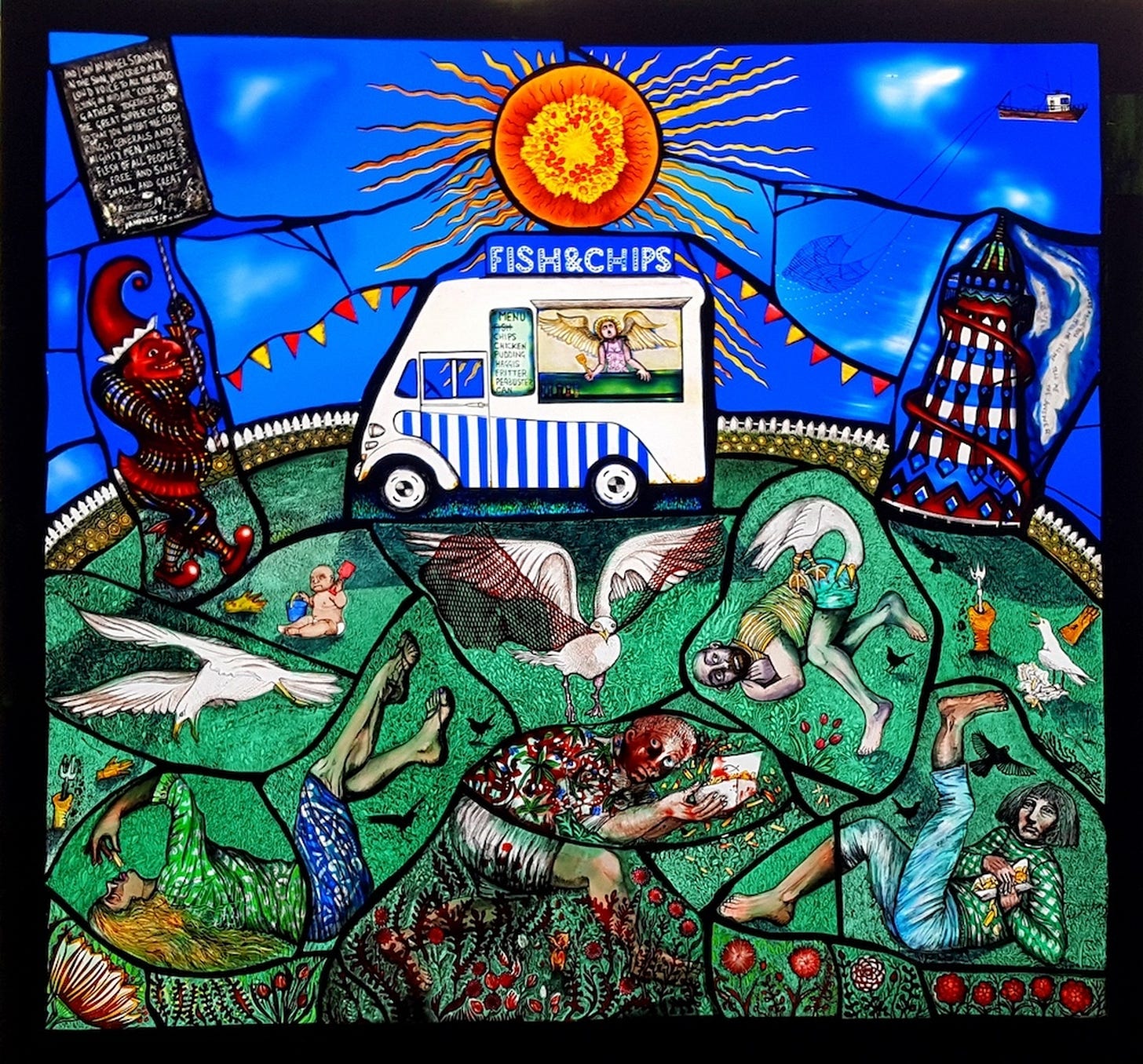Ruins, Re-enchantment & Reclaiming the Commons: Pinkie Maclure’s Lost Congregation, CCA Glasgow
With its rich ecclesiastical history, stained glass connects us to processes of myth-making, ritual, and gathering that still echo through our mostly-secular society. It’s an inherently bewitching and alchemical medium that transforms light and built space. In her first solo exhibition at CCA, Glasgow, award-winning artist Pinkie Maclure skilfully interweaves the sacred and profane elements of stained glass to create beguiling scenes that comment on contemporary society with a mixture of despair, hope, and dark humour.
Brought together in the darkened gallery space, Maclure’s dazzling skill is writ large. Each intricate piece is richly layered – both formally and conceptually – and opens a vista on scenes from ordinary life made strange by the artist’s unique narrative art. Maclure imbues foliage, fauna, and soil with a mystical luminosity that encourages us to look anew at the natural world around us, finding hidden beauty. By combining traditional craft with experimental techniques, Maclure’s work is innovative and ever surprising: collaged elements with newspaper print and fabric mix with heavily engraved shards and glowing blooms of colour and pattern. There is a sculptural depth and dimension that invites the viewer to come closer, to trace fractures, and peer into the radiant brilliance of each glass fragment.
It's a delight to encounter Beauty Tricks (2017, featured in Decorating Dissidence’s first journal issue in 2018) in all its glory. Intricate details emerge, such as the tiny bottles labelled with false promises (‘eternity’) and scales bearing the judgement ‘worth it’ and ‘not worth it’ floating above the central figure of a woman at the mercy of the title’s beauty tricks – her head surrounded not by a halo of light, but by syringes and scalpels. While a goblin-like Satan escapes with books in the top half of the work, a young girl with a gun begins to blast through the scene, breaking the barriers that have confined the other women.
Black Friday and the Ghosts of Thrift (2019) similarly critiques the damaging demands of capitalist society, with shoppers descending in a spiral of consumption and debt; to the left, monochrome spectres (representing an older era of make do and mend) hover with pained expressions. Considered alongside Maclure’s scenes of organic life, the works form a powerful ecofeminist manifesto for a more ethical way of living with and from the earth. This exhibition also situates Maclure in a lineage of outsider visionary women artists, such as Madge Gill and Mina Loy (another artist who merged elements of the celestial sublime with social realism, in her later works).
The centrepiece of the exhibition is The Soil (2023), which hangs in an immersive abandoned chapel installation, complete with pews that invite visitors to sit and contemplate this imposing secular altarpiece. A haunting soundscape fills the room (the result of a collaboration with musician and sound designer John Wills), featuring Maclure’s mournful voice calling children’s names and repeating ‘dust won’t lie’, a reminder of the power in the earth beneath our feet. The Soil features a woman - half saint, half gardener - kitted out in wellington boots and gardening gloves, presides over a plot of earth teeming with microscopic life. Vibrant flowers and foliage burst from the earth, surrounded by roots and seeds. Maclure created this imposing piece using glass salvaged from a Victorian greenhouse flattened in a storm; a lament for the loss of ecological environments and our communal right to the land, but also a celebration of nature’s ability to regenerate and grassroots activism’s role in reclaiming the land. As in most of these pieces, a sense of mourning and grief is tempered by a note of hopefulness, of beauty salvaged from the ruins.
Being part of Maclure’s Lost Congregation is to be immersed in a collaborative act of reimagining our environment. Maclure’s is a timely art that conjures alternative national histories – not of church and state, as one might traditionally expect to find in stained glass scenes, but stories of class and gender struggles and the history of the commons. Emerging from darkness of the CCA, I thought of another urgent voice in the struggle for a feminist, ecologically ethical re-enchantment of the world:
‘No common is possible unless we refuse to base our life and our reproduction on the suffering of others, unless we refuse to see ourselves as separate from them. Indeed, if commoning has any meaning, it must be the production of ourselves as a common subject. But “community” has to be intended not as a gated reality, a grouping of people joined by exclusive interests separating them from others, as with communities formed on the basis of religion or ethnicity, but rather as a quality of relations, a principle of cooperation and of responsibility to each other and to the earth, the forests, the seas, the animals.’ – Silvia Federici, Feminism and the Politics of the Common
Pinkie Maclure, The Lost Congregation, CCA Glasgow (17th June to 9th September 2023)







